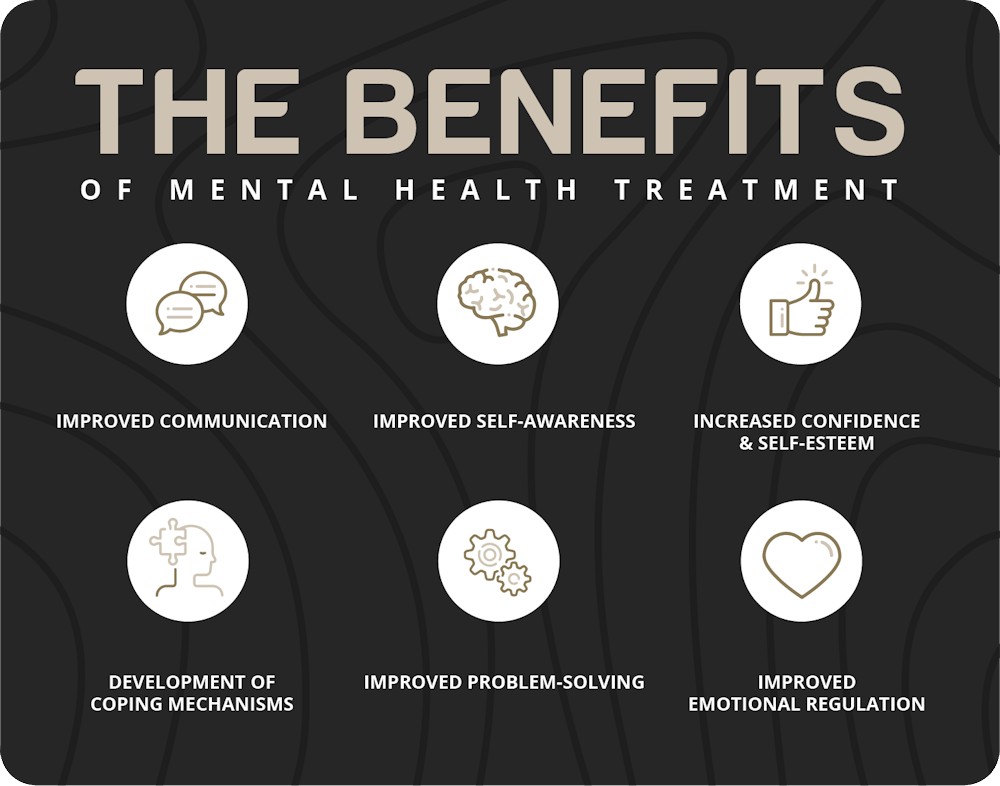A Biased View of Mental Health Counseling
A Biased View of Mental Health Counseling
Blog Article
The 20-Second Trick For Mental Health Counseling
Table of ContentsNot known Facts About Mental Health CounselingAn Unbiased View of Mental Health CounselingThe Main Principles Of Mental Health Counseling 10 Simple Techniques For Mental Health CounselingThe 8-Minute Rule for Mental Health Counseling
Through therapy, you can acquire insight into your own patterns of actions and interaction, which can result in even more meeting and satisfying partnerships with close friends, household, and enchanting partners. What we think, we show up. If you're consumed with adverse feelings and unfavorable thoughts that are disrupting your life, treatment can aid., or there are various other adverse ways you act. Therapy can help you modify those actions that are having an unfavorable influence on your world and partnerships.

The relevance of therapy exceeds your psychological health and wellness. Obtaining therapy to deal with certain facets of your life can assist you be more efficient in various other areas, consisting of work. Some research has actually even revealed that there's a direct connection between looking for mental health and wellness aid and a reduction in missed out on job.

A Biased View of Mental Health Counseling
There are even extra advantages of treatment than simply the ones we have actually discussed., or build relationships (romantic or those with family or buddies) in a healthy and balanced way.
For the purpose of today research study, regarded benefits and barriers to mental health help-seeking are being explored. Previous study located that viewed barriers have a considerable impact on college students' wellness habits options (Von Ah, Ebert, Ngamvitroj, Park & Kang, 2003). Perceived benefits and barriers to help-seeking were specifically selected as a result of their impact on decision-making and ultimately action (Glanz, Rimer, & Su, 2005).
The existing research study seeks to check out whether or not stigma offers as a barrier to therapy amongst university trainees. Among these were: (1) favoring to deal with psychological health issues themselves, (2) not having adequate time to get involved in therapy, (3) inquiries about whether psychological wellness treatment is efficient in remediating troubles, (4) an idea that tension is typical or the trouble will certainly obtain far better without therapy, (5) lack of cash, and (6) fret concerning what others would certainly think if they discovered out about treatment engagement.
(2006) reported similar variables as barriers to seeking treatment and likewise located that a skepticism of companies might impede students from seeking help. Staff in school psychological health centers might be regarded as unfriendly, and long wait times for solutions might be "off-putting" for trainees. Elements assisting in much more favorable perspectives are frequently at the opposite post of those variables identified as obstacles.
Mental Health Counseling for Beginners
One in 3 (34.6%) reported surviving school and one in 4 (23.3%) reported living with moms and dads. Almost half of students were involved in university companies and 1 in 10 reported remaining in a fraternity or sorority. More than one-third of trainees (38.1%) reported that they had a read this family member or close friend with an identified mental health problem.

The 8-Minute Rule for Mental Health Counseling
Univariate F-tests determined details subscale items that substantially varied. Women were much less most likely than men to view individuals that go to therapy as mentally weak, individuals that go to therapy as insane, to really feel that individuals with mental illness need to take care of troubles on their very own, that people who go to counseling as unable to fix issues, that individuals who most likely to therapy slouch, view and to feel that people that most likely to therapy are various from regular people in a negative way.
Research results exposed that ladies were considerably much less most likely than males to hold stigma-related mindsets. This follows previous research which additionally discovered that men hold higher levels of regarded stigma than women (Chandra & Minkovitz, 2006). Based upon study findings, it appears that men may be much less likely than ladies to seek therapy due to low regarded obstacles as well as high stigma-related mindsets.
The Best Guide To Mental Health Counseling
In addition, college wellness professionals may use curricula targeting men with info on the advantages of mental health and wellness treatment and the value of seeking assistance when needed. All strategies ought to be evaluated with future study to figure out the impact on university student, particularly men. As opposed to basic population researches which disclose that females are extra likely to seek out mental health solutions contrasted to guys (Haunstein et al., 2006; Mackenzie, Gekoski, & Knox, 2006), the here and now study located no substantial differences in the number of regarded obstacles to help-seeking habits based on sex.
Researchers hypothesize that this is mainly as a result of standard social norms see post and sex roles that identified males based upon stamina and lack of psychological expression (Addis & Mahalik, 2003; Ang, Lim, Tan, & Yau, 2004; Mojtabai, 2007). In general, there have actually been blended outcomes among the university pupil populace regarding sex distinctions (Rosenthal & Wilson, 2008). This finding was unforeseen and might highlight that those that had obtained counseling had a far better idea of delay times and other "accessibility" barriers that might make it difficult to begin treatment. Probably, individuals who have gotten counseling view extra obstacles than participants that have actually not gotten therapy considering that looking for counseling services once more can involve concern of self-disclosing individual info to a new therapist.
Report this page